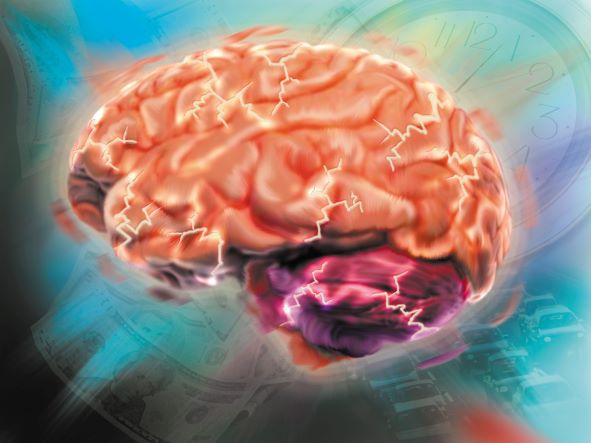Research finds no proof of any brain disorder that antidepressants and electroshock supposedly target and no proof of any lasting benefit to patients from them.
A recent review of evidence found that the two main physical treatments recommended for depression, antidepressants and electroconvulsive therapy (ECT), are ineffective, harmful to brain function, and rest on assumptions of brain dysfunction that have never been proven.
Researchers John Read, a professor of psychology, and Joanna Moncrieff, a professor of psychiatry, writing in Psychological Medicine at the request of the British psychiatrist who is the editor of the publication, agreed with previous reviews of evidence that concluded there is no proof of the existence of the brain dysfunctions that antidepressants and ECT claim to correct.

“Despite claims by professional organizations and the pharmaceutical industry that depression is due to a chemical imbalance that can be rectified by drugs, there is no evidence that there are any neurochemical abnormalities in people with depression, let alone abnormalities that might cause depression,” they wrote, in a
Antidepressants and electroshock are, therefore, targeting the brain for conditions that do not exist, according to these researchers.
Turning to the question of whether antidepressants have any value to patients, the researchers reviewed meta-analyses of antidepressant studies and found there is no clinically significant improvement for patients taking the drugs, stating plainly that “antidepressants are no better than placebos.” They noted that antidepressant trial results were likely boosted by the publication bias of concealing negative trial outcomes, and still the results were no demonstrable benefit to patients over sugar pills.
“Despite claims by professional organizations and the pharmaceutical industry that depression is due to a chemical imbalance that can be rectified by drugs, there is no evidence.“
– Research psychologist John Read and psychiatrist Joanna Moncrieff
Antidepressants do, however, have demonstrable side effects. Among them, the researchers singled out sexual problems: “SSRI antidepressants cause sexual dysfunction in a large proportion of users, and more worryingly, some people report that this persists after stopping the drug.”
The Citizens Commission on Human Rights database of psychiatric drug side effects currently lists 283 research studies and 155 warnings from international drug regulatory agencies about the adverse effects of antidepressants, which include anxiety, aggression, impulsiveness, mania, violence, worsening depression, and suicidal thoughts and actions.
Recent research has also found that 56% of people who attempt to come off antidepressants experience withdrawal effects, with nearly half (46%) of them rating those effects as “severe.”
Read and Moncrieff comment that because antidepressants are prescribed in an erroneous belief about a chemical imbalance in the brain causing depression, “their use may discourage people from addressing the circumstances that caused their depression in the first place.” Taking antidepressants as a supposed solution can lead people to put off pursuing real solutions to the actual causes of their depression.
Worse still, antidepressant users can become physically and emotionally dependent on antidepressants. “Research confirms that people may come to believe they need antidepressants to stay well, and therefore become fearful of stopping them, leading to ever-increasing numbers of long-term users,” the researchers observe, further noting that “the longer antidepressants are used, the greater their adverse effects, including the likelihood of severe and protracted withdrawal syndromes.”
Concerning the use of electroconvulsive therapy to treat depression, Read and Moncrieff write: “As is the case for antidepressants, the various biological deficits that are supposedly corrected by ECT have never been demonstrated.” In other words, there is no proof of any disorder of the brain that administering electroshock could possibly cure.

ECT proponents are unable to explain how repeatedly passing up to 460 volts of electricity through the brain, causing grand mal seizures, memory loss and brain damage is supposed to be therapeutic.
Responding to criticism of his research on ECT, Read summarizes the lack of evidence for it in a follow-up article. He states that there have only been 11 placebo-controlled studies of ECT, where general anesthesia, but not electric shock, constituted the placebo. All of the studies had very small sample sizes and were seriously flawed. Four found short-term benefit to some patients, five found no difference between the two groups at the end of treatment, and two had mixed results, including one where psychiatrists reported a difference, but nurses and patients did not.
Even the short-term benefit reported by some patients is subject to an explanation other than the ECT itself. Read and Moncrieff state that “the temporary lift in mood experienced by some ECT recipients is primarily a placebo effect.” Positive expectations can lead patients to want to report a benefit for having undergone the procedure.
Beyond the serious flaws that undermine the validity of the findings of these studies, none of them found any lasting benefit to patients from electroshock.
“No studies have found any evidence that ECT is better than placebo beyond the end of treatment,” Read flatly states. He notes that the FDA requires ECT machines to have signs next to them stating: “The long-term safety and effectiveness of ECT treatment has not been demonstrated.”
In addition to a lack of evidence that ECT is effective in treating depression, Read and Moncrieff report there is no evidence that electroshock prevents suicide. In fact, they cite evidence that ECT increases the risk of suicide, including one study that found 1,524 homeless U.S. veterans who received ECT made significantly more suicide attempts during the year following their treatment than 3,025 matched homeless vets who had not been electroshocked.
“Numerous studies have found ECT recipients are more likely than other patients to kill themselves,” they state.
Returning to the unproven premise of depression caused by a chemical imbalance or disorder of the brain, the researchers point out the psychological toll such a belief takes on a depressed individual, saying it can be “profoundly disempowering.”
“It encourages people to view themselves as the victims of their biology, to adopt pessimistic views about recovery, increases self-stigma and discourages people from taking active steps to improve their situation,” they write.
Instead, they recommend understanding depression as “a ‘normal’ human emotion, albeit sometimes extreme and disproportionate – that is, as a meaningful reaction to depressing events and circumstances.” Tackling the societal conditions that can lead to depression is a proactive, commonsense approach, they advise. Even people who have felt severely depressed for a long time “may simply need to be cared for, reassured with kindness and hope, reminded of times when they have felt good, and kept safe until they feel better, which they often do with time,” the researchers suggest.
Since 1969, the Citizens Commission on Human Rights (CCHR) has exposed the lack of effectiveness and the harm of antidepressants, ECT and other psychiatric drugs and practices and supported alternative, non-harmful approaches to mental health. CCHR has been pivotal in obtaining laws that introduced safeguards against ECT, such as informed consent to treatment (and the right to refuse it) and banning the use of ECT on minors. CCHR’s online petition calling for ECT to be banned has been signed by more than 130,000 people.
WARNING: Anyone wishing to discontinue or change the dose of any psychiatric drug is cautioned to do so only under the supervision of a physician because of potentially dangerous withdrawal symptoms.
